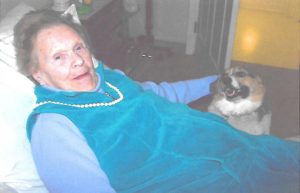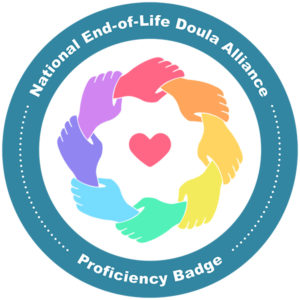Frequently Asked Questions
Q: What is the difference between a hospice nurse and an End of-Life Doula?
A: Time and roles. The hospice nurse is the medical manager of the terminal patient with limited time at the bedside. The End-of-Life Doula is the non-medical professional that is the eyes and ears of the case with no time limitations. The End-of-Life Doula alerts the hospice team to any changes in the patient’s presentation so that the hospice nurse can assess and update the care plan for maximum daily comfort of the patient, the goal of hospice.
____________________________________________
Q: What is the difference between a hospice volunteer and an End-of-Life Doula?
A: An End-of- Life Doula can do everything EXCEPT give a medication and do any form of medical treatment or wound care. The hospice volunteer needs to follow Medicare regulations that prohibit any form of touching, moving, feeding, bathing, toileting etc. The hospice volunteer in most US states is limited to a maximum weekly bedside visit of 4 hours. The average volunteer visit is 1-2 hours a week. This does not provide the adjunct support that patients and families so desperately need at this stressful time.
____________________________________________
Q: Does insurance cover the services of an End-of-Life Doula?
A: No. End-of-Life Doulas are private pay. All “companion” services such as Home Instead, Visiting Angels and Comfort Keepers, etc. are all private pay. End-of -Life Doulas can offer a sliding scale payment option.
____________________________________________
Q: Can an End-of-Life Doula give any medications? What about over the counter medications?
A: No. An End-of-Life Doula never gives any medication whether prescription or over the counter.
____________________________________________
Q: Can an End-of-Life Doula help make funeral arrangements for me?
A: Yes. An End-of-Life Doula has a “scope of practice” that includes everything from the time of a terminal diagnosis to helping patients and families as the illness progresses, to the vigil, time of death, after death care, understanding and honoring grief and finally recover of life after loss.
____________________________________________
Q: What services and support will hospice provide for me after my loved one has died?
A: Most hospice teams leave a case after the patient has died. Many times families are feeling this as another loss. Hospice does offer bereavement services for up to a year or 15 months in most states. This is usually initiated by a call from a volunteer and the living family member is told about monthly support groups that they may attend. The original hospice team that worked with the family is not part of this service.
____________________________________________
Q: Can the End-of-Life provide ongoing grief support for family members?
A: Yes, whenever called upon, with no time limitations.
____________________________________________
Q: What can an End-of-Life Doula do that a Hospice home health aide cannot do?
A. She can provide more service time. Most hospices provide HHA services up to a maximum of 2 hours a day 5 days a week. This is based on acuity of the patient and is only available if the hospice has an available aid.
____________________________________________
Q: Is there government licensure for End-of-Life Doulas?
A: No. End-of-Life Doula is a Non-Medical Profession. Just like the establishment of Birth Doulas forty years ago. This is not regulated by a government license.
____________________________________________
Q: Are there any national organizations regulating the standards and scope of practice for the End-of -Life Doula Profession?
A: Yes. The National End of Life Doula Alliance (NEDA) has set a national practicum with Core Competencies for the practice of professional End-of- Life Doulas. All End-of-Life Doulas that pass the assessment receive the NEDA National Credential and can become members of the national membership organization
____________________________________________
Q: Does Hospice approve of End-of-Life Doulas?
A: Yes. The National Hospice and Palliative Care Organization (NHPCO) is the membership organization for all the hospices in the US. The have just put together The End-of-Life Doula Council to be able to share with Hospices and families how the Professional End-o- Life Doula can assist and complete the hospice team to fill in “the gaps in care” and allow for the best end of life experience for both the patient and their loved ones
____________________________________________


